Croatian Experts on Energy Transition: Customer Protection from High, Unstable Prices Essential
April 30, 2023 - Association XEnergy - Network for the promotion of women in the energy transition gathered leading energy experts in one place for the first time who presented 5 key guidelines for the successful implementation of the energy transition in Croatia but also emphasized the importance of adopting new regulations with the aim of achieving the energy and climate goals of the EU
After the European Commission proposed the Regulation governing the reform of the electricity market model in March 2023, before the European Parliament and the member states is the period of drafting a legal framework that should encourage greater use of renewable sources, prevent large fluctuations in energy prices, and make the industry cleaner and global more competitive. On this occasion, some of the leading Croatian experts from the public and private energy sector gathered in Zagreb at the round table "New models of the organization of the electricity market to accelerate the energy transition".
A stable regulatory framework that will enable investment in electric power networks and the flexibility of the system and its users, the meaningful use of location criteria when calling for tenders, the removal of administrative obstacles for the development of energy sharing, the coordinated creation of strategic documents and the simplification of the issuing of permits, and the coordination of stakeholders in the implementation of public calls and tenders throughout the year is key to the successful implementation of the energy transition. Those are the five guidelines that emerged from the round table organized by the Network for the promotion of women in the energy transition XEnergy.
To achieve the EU energy and climate goals and to stabilize electricity prices, the member states must define concrete measures and activities, and Ph.D. Kristina Čelić, director of the Directorate for Energy at the Ministry of Economy and Sustainable Development, pointed out that the Croatian administration is working on this, and invited all stakeholders in the sector to get involved with proposals.
Members of XEnergy who participated in the panel discussion are Ph.D. Lahorko Wagmann, director of the Electricity Sector of Croatian Energy Regulatory Agency (HERA), Ph.D. Minea Skok, Hrvoje Požar Energy Institute, president of the Scientific Council, Tina Jakaša, Petrol, head of energy product development, Martina Biondić, secretary of XEnergy, Darjan Budimir, Croatian Energy Market Operator (HROTE), deputy director, Saša Jovičić, Wolf Theiss, partner, Antun Andrić, The independent Transmission System Operator in Croatia (HOPS), director of the market sector and Martina Vajdić, CROATIAN POWER EXCHANGE Ltd., market manager. The proposal intends to promote investments in renewable sources, encourage flexibility of consumption, facilitate energy sharing, increase protection against price volatility, strengthen the position of end customers on the electricity market, and improve the competitiveness of the EU industry, said Ph.D. Lahorko Wagmann.
Consumer protection from unstable and high electricity prices, ensuring the stability of market supply and systematically encouraging investment in renewable energy sources are key factors in the energy transition are the topics that were discussed on the panel.
"Extreme price volatility and short-term interventions may seem to slow down investment waves in renewable energy sources, which may consequently jeopardize the achievement of the EU's decarbonization goals. The new electricity market model will increase the shares of wind and solar in the electricity mix, and will accelerate investments in flexibility, solid production capacities, and energy storage. All this should along with investments in the power grid, which will also be needed to face new system challenges, such as an even greater number of distributed energy sources, rapid response to demand, less predictable electricity flows with intermittent production patterns ", said Martina Biondić, secretary and one of the founders of XEnergy.
EU has had an efficient and well-integrated electricity market for more than 20 years, where the energy supply is ensured, the decarbonization process is encouraged, and consumers can realize economic benefits from the single energy market. The energy crisis triggered by the situation in Ukraine pointed to the need for rapid adjustment of the electricity market to better support the green transition and provide energy consumers – both households and businesses – with broad access to affordable electricity from renewable sources.
"In response to the new geopolitical reality and the situation in the energy market, the EU decided to drastically accelerate the transition to clean energy, which, among other things, implies a significant acceleration of the construction of renewable energy sources. The REPowerEU plan from May 2022 thus requires that by 2030, renewable sources make up 2/3 of electricity production. For end customers today, it is no longer unknown to produce electricity, but what we need to work on is to strengthen their active participation in the energy transition, to the mutual benefit of both the customers and the power system as a whole", said Ph.D. Minea Skok, president of the Scientific Council of the Hrvoje Požar Energy Institute.
The process of acceptance of the Regulation by the European Parliament and the Council, in which the Republic of Croatia has representatives, is expected in the following months.
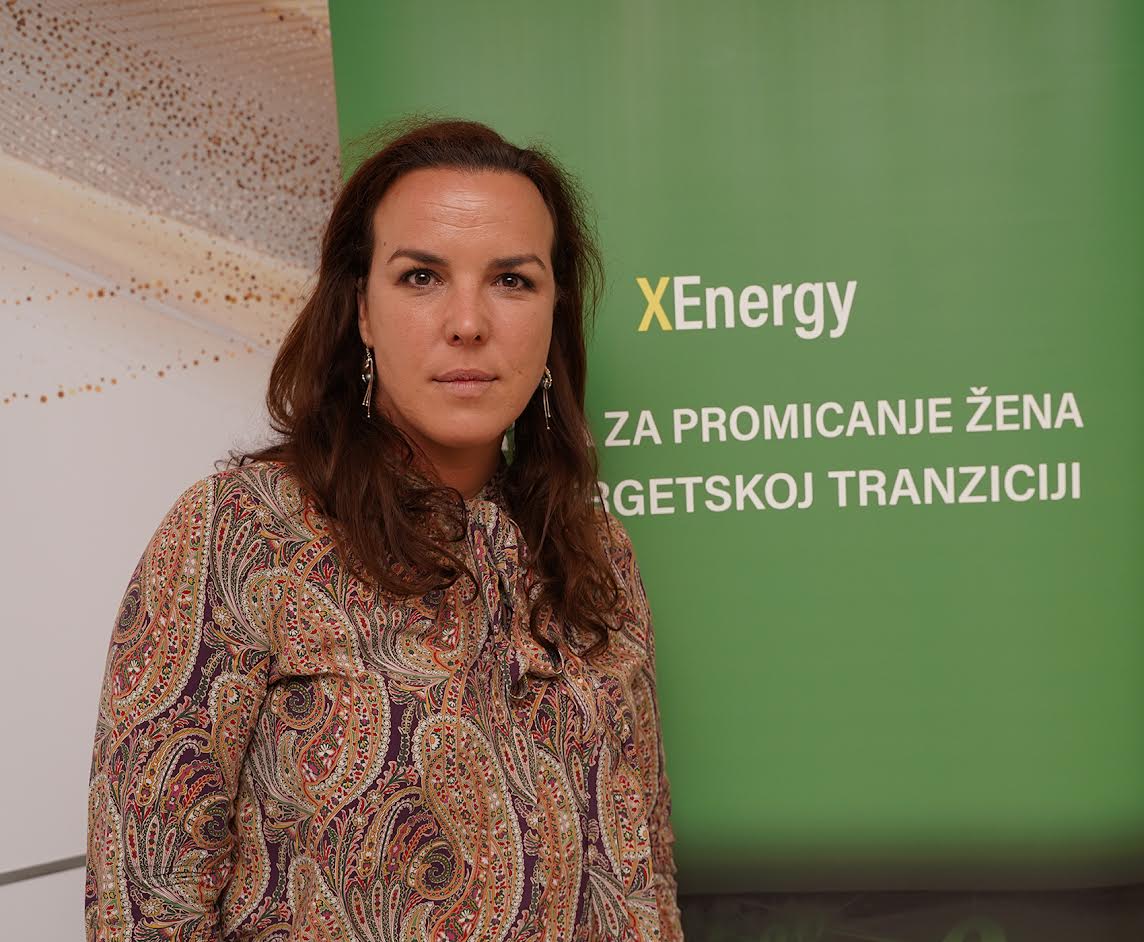
"XEnergy has people with great knowledge and experience that we can offer Croatia in that process, in which women will also play a big role. The association will work to be a support for women, a mentor and guide at the beginning of their career, but also a kind of platform for the exchange of knowledge and experience", stressed Nina Dusper Sušić, vice president of XEnergy, adding that the task of the association is to bring the energy sector closer to young girls and show them how it is possible to be successful in such a STEM industry thanks to the knowledge and support of the network with which they share the same values.
"The proposal of the new model instructs the members to define their goals and measures, therefore we believe that it is very important to immediately start thinking about and communicating the best solutions for the Croatian economy and end customers. With events like this, the XEnergy association wants to make its contribution through the discussion of important issues and challenges and thus help a sustainable and socially just energy transition", stated Nela Vlahinić Lenz, president of the association XEnergy.
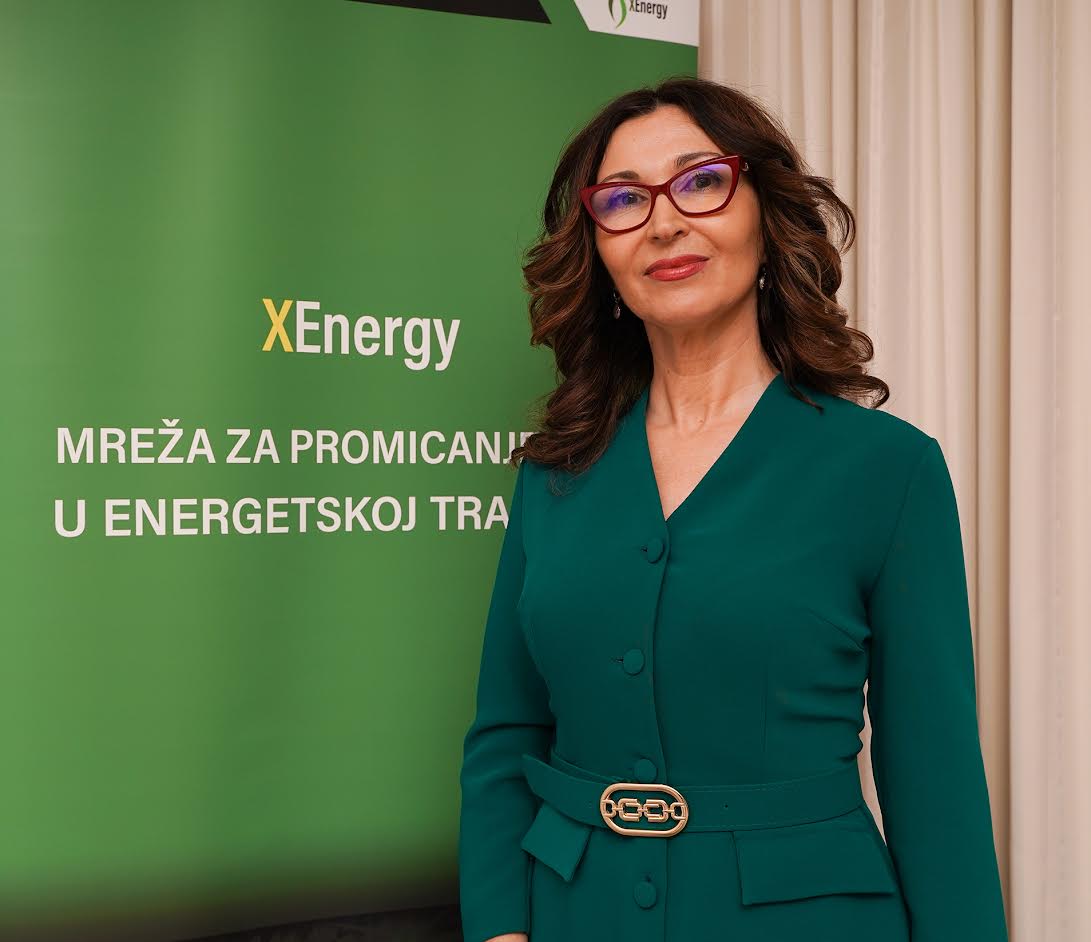
Laws and the regulatory framework, both at the EU level and in Croatia, should be able to follow all these changes for the system to be stable, efficient and flexible and to provide enough energy at optimal prices for end consumers. There is no doubt that this is an extremely current and important topic because market organization models will have a key impact on the accelerated integration of renewable sources and stable electricity prices, thus contributing to the green transition and sustainable development goals, the participants concluded.
About XENERGY
Network for the promotion of women in the energy transition XEnergy is a non-profit organization that gathers all participants in the energy transition and encourages the affirmation of women in the sustainable development of the economy and society as a whole. It acts as a platform for strengthening the role and visibility of women in energy and other sectors through interdisciplinary networking and the synergy of the work of its members, and provides support to women from the private and public sectors in the field of energy transition through networking, mentoring, counseling and education.
Croatian Energy Sector 2021: An Overview
March 7th, 2022 - An overview of the Croatian Energy Sector 2021.
The energy sector is a hot topic these days, and it is not a coincidence since rising prices of electricity, natural gas, and crude oil determine the prices in the overall economy. Energy prices determine the production costs, transportation costs, electricity costs, heating costs among many others. There is a rising concern over the ecological impact of the energy sector as well as the geopolitical impact that has never been more relevant.
Taking into consideration the aforementioned effects, I will shortly go through the energy statistics for 2021 reported by DZS which will give a short description of the Croatian energy sector as it was in 2021.
ELECTRICITY
In 2021, Croatia had total net production of electricity at 14 686 GWh, which is an increase of 14% compared to 2020. Exports and imports amounted to 7505 and 11 342 GWh which leads to 18 359 GWh of electricity available for the inland market. Exports recorded the highest growth with a 28% increase compared to 2020. It should be noted that the imports also include electricity produced by the nuclear power plant Krško in Slovenia of which HEP (Croatian state-owned electricity group) holds 50%.
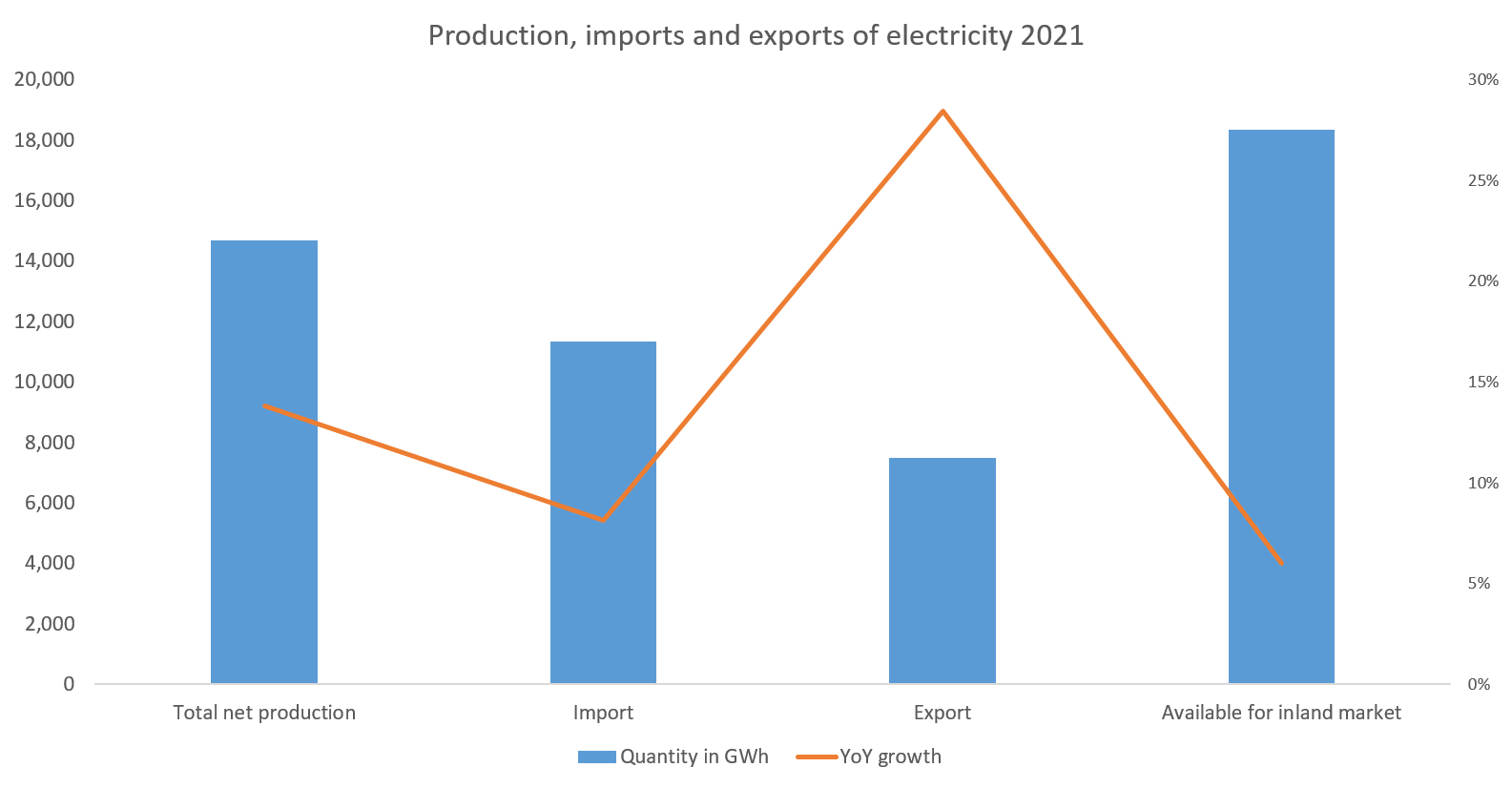
In 2021, 48.8% of the electricity produced in Croatia came from hydropower, 29.6% from thermal power plants and CHP on fossil fuels, 14% from wind power, and 6.5% from thermal power plants and CHP on renewable fuels. Solar power plants and geothermal power plants accounted for only 1%. Around 70% of Croatia's total net production comes from renewable resources.
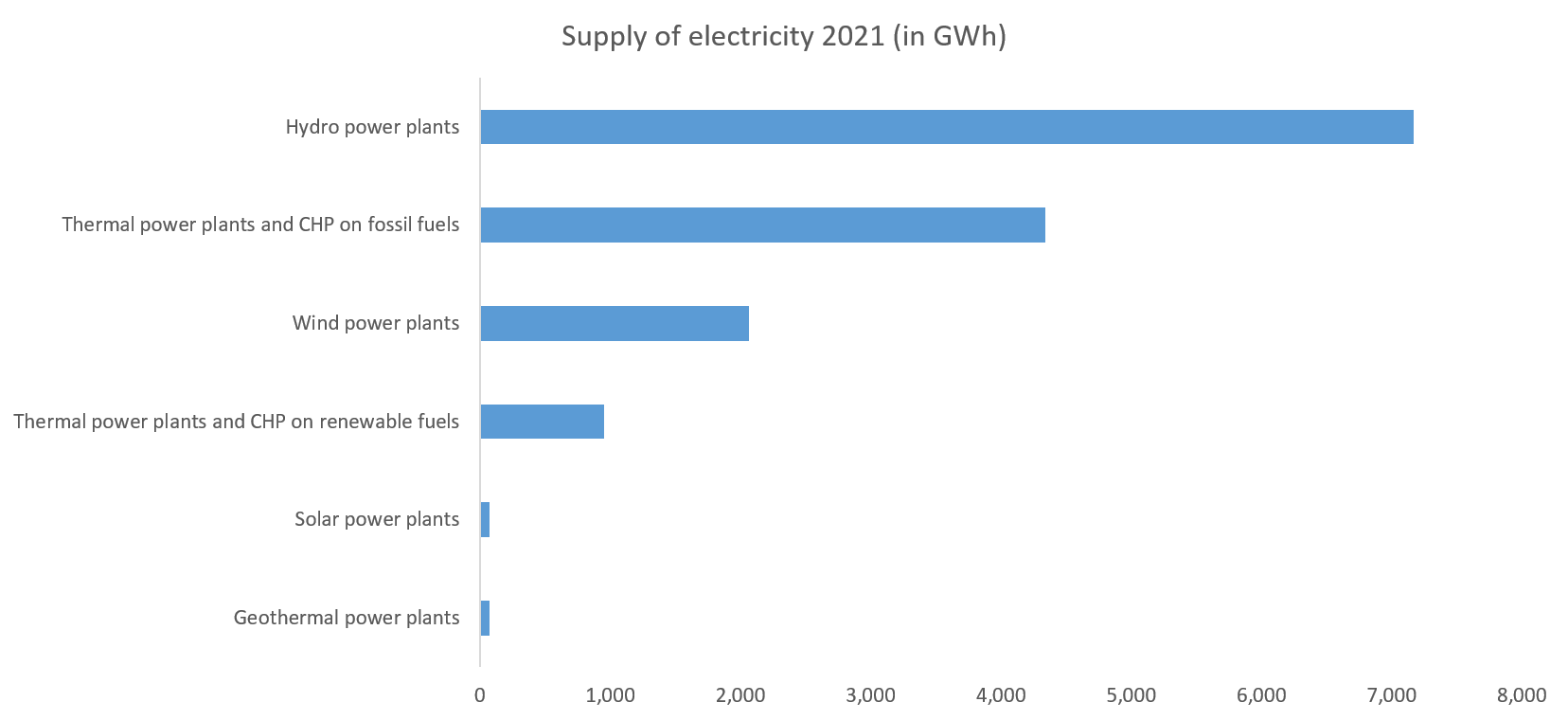
NATURAL GAS
In 2021, production of natural gas in Croatia amounted to 780 mln m3, which is a decrease of 12% compared to 2020. Imports amounted to 2240 mln m3 with an increase of 4%, while exports reached 76 mln m3. From natural gas that is available for the inland market, 76.5% comes from imports. Croatia is clearly a natural gas net importer with an export-to-import ratio of 0.03.
CRUDE OIL
In 2021, the production of crude oil in Croatia reached 558 thousand tonnes, a decrease of 4.6% compared to 2020. Imports were at 1767 and exports at 490 thousand tonnes. Both imports and exports were experiencing a year-on-year decrease with 9.2% and 22.5% each, respectively. Refinery input in 2021 was 1849 thousand tonnes which were also lower by 5.8%. Again, as with natural gas, Croatia is a crude oil net importer with an export-to-import ratio of 0.27.
PETROLEUM PRODUCTS
In 2021, 2461 thousand tonnes of petroleum products were produced in Croatia which is a decrease of 4.9% compared to 2020. Gas/Diesel oil had the biggest share with 45%, followed by motor gasoline with 24%.
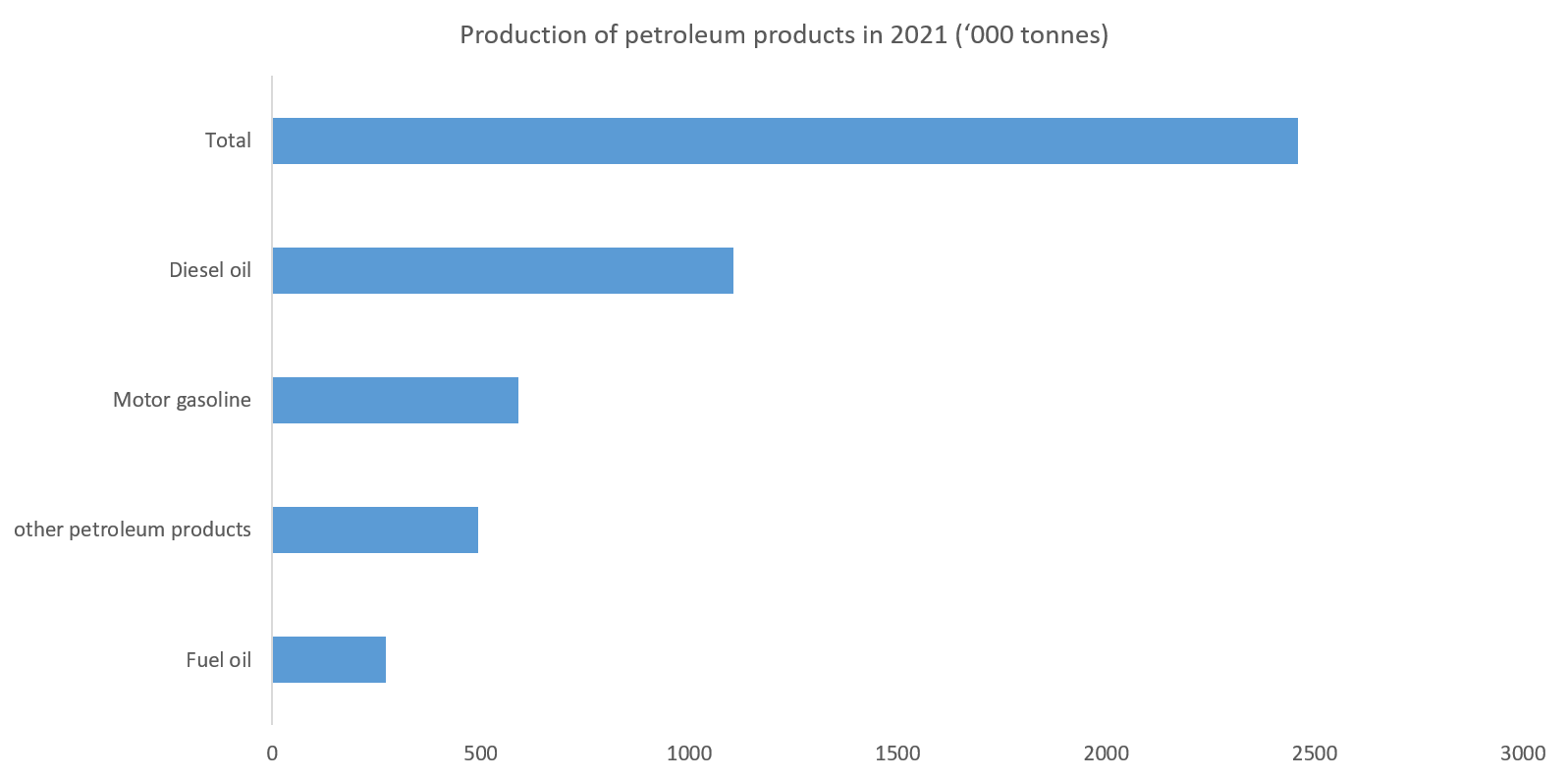
All observed categories of petroleum products experienced a decrease in the level of production, except for fuel oil which saw an increase of 5%. The same holds for imports and exports, all of the categories except fuel oil saw an increase in imports and decrease in exports compared to 2020.
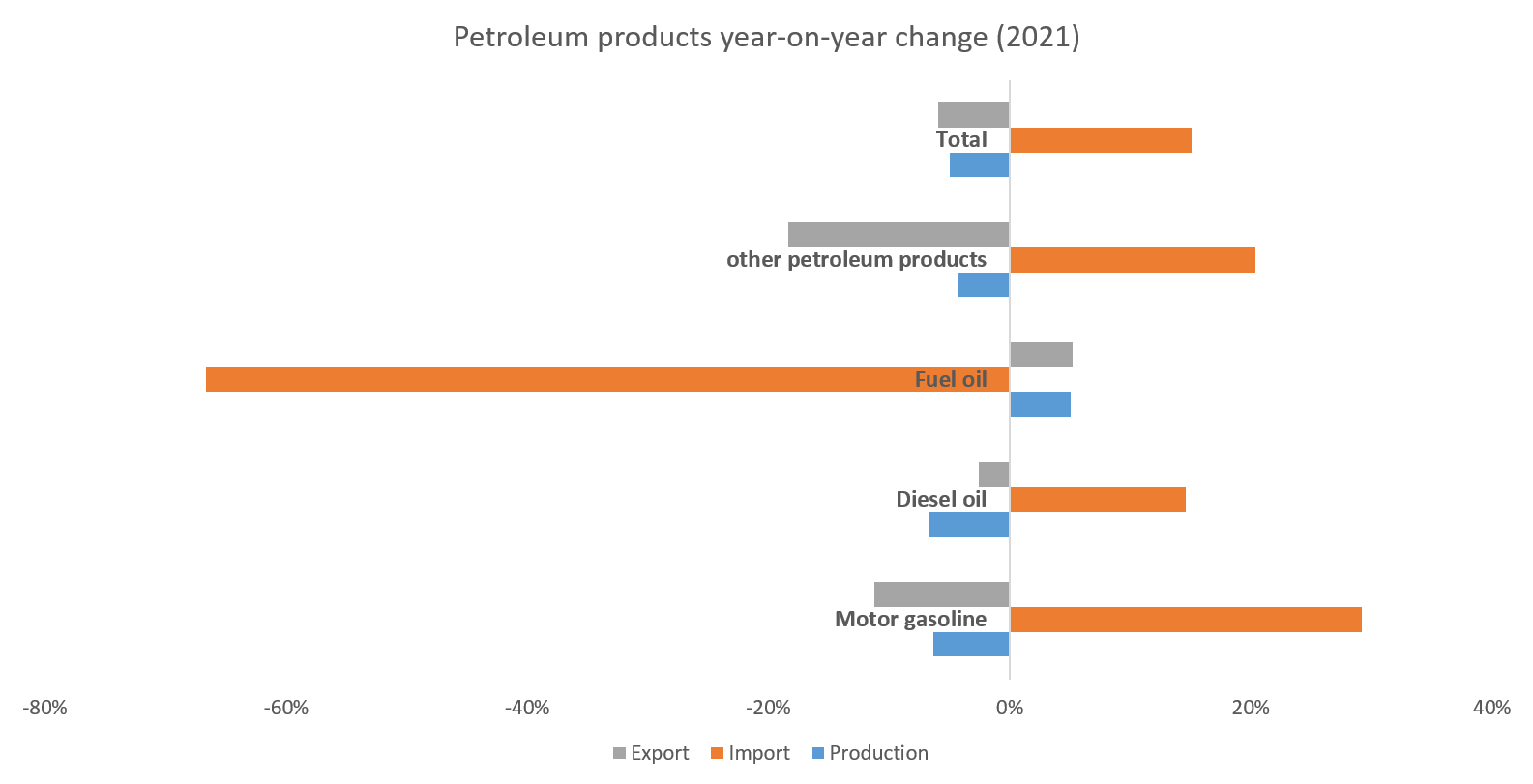
Looking at the export-import ratio we can see that Croatia is a net exporter in both motor gasoline and fuel oil with ratios of 1.875 and 21.91 in that order. On the other hand, Croatia is a net importer of Gas/Diesel oil and other petroleum products with ratios of 0.49 and 0.59. The category of petroleum products as a whole also has higher imports than exports with a ratio of 0.73.
CRUDE FUELS
Crude fuels are made of hard coal, coke, and brown coal. Croatia does not produce either of these three subcategories of crude fuels. In 2021 Croatia has imported 669 thousand tonnes of hard coal, 29 thousand tonnes of coke, and 4 thousand tonnes of brown coal. Comparing the import data with 2020, we can observe an increase of both hard coal and coke imports by 13.4% and 3.6% respectively. On the contrary brown coal, imports have decreased by 77.8%.
For more, check out our business section.
Croatia Can Become Self-Sufficient in Electricity Production
ZAGREB, January 30, 2019 - Environment and Energy Minister Tomislav Ćorić said on Tuesday that in the next 30 years Croatia could become self-sufficient in electricity production and eventually start exporting electricity.
Ćorić made the statement at the conference "Towards a new energy strategy", organised by the Jutarnji List daily. He noted that for a country the size of Croatia it was difficult to achieve full energy independence, especially with fossil fuels. "What we can do over the next 10 or 20 or 30 years is to try to fully meet our needs from our own electricity production and eventually start exporting, because we have sufficient renewable energy potential," the minister said.
Ćorić said he expected Parliament to adopt the new national energy strategy by the end of the second quarter, adding that the Green Paper of the Hrvoje Požar Energy Institute, which had been under public consultation in the last few months, served as the platform for the preparation of the strategy.
Ćorić noted that the Green Paper saw the largest potential in renewable energy sources, primarily the wind and sun. As for gas infrastructure, he said that gas consumption was expected to stagnate and decrease by 2050.
Sabina Škrtić, a board member of the ENNA Group, said that the Green Paper offered an inappropriate energy mix without sufficiently recognising waste energy and gas infrastructure. "The Green Paper should try to take advantage of the best that Croatia has and offer an optimum mix that will, first and foremost, lead to competitiveness," Škrtić said.
The CEO of RWE Energija, Zlatko Miliša, said that solar energy could be the "golden goose" for Croatia given that it has over 50 percent more hours of sunshine than some countries in continental Europe. "Each feasibility study of ours starts off with 50 percent better results," Miliša said. He noted that costs of technology in this sector are rapidly falling, which opens the possibility of operating solar power plants without subsidies.
"With the existing costs of electricity, projects for the construction of solar power plants along the Adriatic coast can become profitable within six to eight years without any subsidies," Miliša estimated.
Petar Sprčić, a board member of the state-owned power company HEP, said he was pleased that the strategy defined self-sufficiency among its goals and that Croatia was starting to use its own resources.
Minister Ćorić said that the construction of an LNG terminal on the northern Adriatic island of Krk would bring about security in terms of diversifying supply routes and would become commercial over time. He said he believed Croatia would find commercial interest in it, primarily in capacity booking by companies from neighbouring countries.
Ćorić said that from the point of view of energy security and the geopolitical point of view, this was one of the few projects that could put Croatia on the map of Europe and the world. "I'm not sure if there is an energy project of such potential in our neighbourhood," he said.
Ćorić said he believed that capacity booking would increase with time from the present 520 million cubic metres out of the total of 2.6 billion cubic metres. He cited several letters of intent from Hungarian companies and the possible interest of Slovenian companies.
Sandor Fasimon, the CEO of the INA oil and gas company, which has made an offer for the lease of capacity of the future LNG terminal, said he understood Croatian government efforts about this project because more options and alternative sources would lead to greater security of supply.
More news on the energy issues in Croatia can be found in the Business section.
Historic Miljacka Power Plant Enters Hydro Hall of Fame
The power plant in the Krka National Park is one of the oldest still active hydroelectric power plants in the world.
HEP to Produce 70% of Electricity from Renewable Sources
ZAGREB, June 28, 2018 - By 2050, the Croatian state-run power company HEP will produce 70% of electricity from renewable resources, the president of the HEP management board Frane Barbarić said on Thursday during a ceremony of signing an agreement on the construction of a solar power station on the island of Cres, the first in a series of planned power plants to be run on solar power and other renewables.
Two Serbian Towns to Buy Electricity from Croatia
Croatian Electricity Company (HEP) has won tenders in Kraljevo and Valjevo.
HEP Wins Electricity Tender to Supply Croatian State and Public Administration Bodies
A big contract for electricity supplier, HEP.
Croatia's HEP Plans Expansion to Montenegro
Further regional expansion from Croatia's electricity supplier?
Croatian Energy Company HEP Expands to Slovenia
Croatian electricity supply extends to Slovenia.


